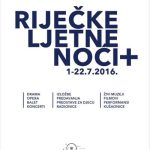ZAGREB, February 27, 2018 – On Tuesday, Croatian President Kolinda Grabar-Kitarović held in her office a presentation of the project “Rijeka – European Capital of Culture 2020” for representatives of diplomatic missions and international organisations accredited in Croatia. The presentation was prepared by Rijeka City officials and the company “Rijeka 2020 d.o.o.”, in charge of implementing the project.
The diplomats were acquainted with the course of preparations and plans regarding the project and were invited to put forward their proposals and ideas in order to more actively engage in cooperation in the field of cultural diplomacy.
The European Capital of Culture is an initiative designed to highlight the richness and diversity of the artistic development of European cities, as well as the common cultural features, as a way of contributing to bringing European nations closer and enhancing their mutual understanding. Every year, two cities in two EU countries are designated the European Capital of Culture and, in 2020, along with Rijeka, the title will also be awarded to Galway, Ireland.
Addressing those who had gathered for the presentation, Grabar-Kitarović recalled that Rijeka was her hometown and that it was the first Croatian city designated as the European Capital of Culture. She noted that, in the first half of 2020, Croatia would be chairing the EU and would thus be the centre of political and other social developments in Europe.
“Rijeka is a city a with centuries-long tradition in education and higher education, it is an industrial centre, a city of youth and lively artistic production open to cultural cooperation,” Grabar-Kitarović said, among other things.
The project Rijeka – European Capital of Culture 2020 is aimed at enhancing the scope and diversity of the city’s culture, encouraging access and participation in culture, strengthening the cultural sector’s capacity and its ties with other sectors and increasing the city and region’s international visibility, it was said. More information on the course of preparations for the project will be known in the second half of 2019.
Emina Višnić, manager of Rijeka 2020 d.o.o., said that Rijeka was an industrial city with a turbulent past and that in the past 100 years it had been part of six states, as well as that it was the biggest Croatian port city and home to 23 ethnic minorities.
The head of the Rijeka City Department of Culture, Ivan Šarar, said that no new buildings would be built as part of the project but that existing facilities that are part of the city’s industrial heritage would be used, with a focus on the industrial complex Benčić, which would be renovated to house the Museum of Modern and Contemporary Art, the City Library, the Children’s House and the City Museum.
One of the leading attractions of the project will be the ship Seagull, used by Yugoslav leader Josip Broz Tito, which will be converted into a floating museum, it was said.
The project’s art director, Slaven Tolj, said the project strategy would focus on three main topics – work, water and migrations.









